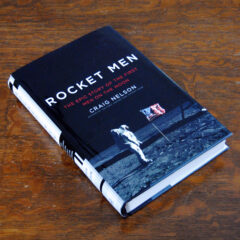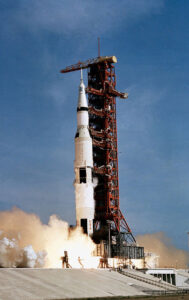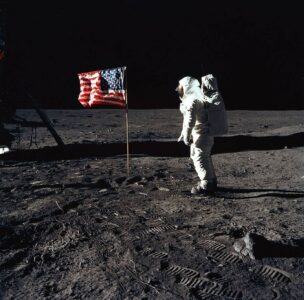
Rocket Men: The Epic Story of the First Men on the Moon is the most complete story of Apollo 11 I have ever read. And that’s saying a lot considering how much I have read on the subject and how still engaged I am in learning as much as I can about NASA during its height of Mercury, Gemini, and Apollo.
This book also covers the post-mortem of the program but let’s first see how this compares to the rest.
For some clarification, let’s take a look at what I’ve already read.
- Of the crew of Apollo 11:
- Carrying the Fire (Michael Collins autobiography)
- Return to Earth (Buzz Aldrin’s autobiography)
- First Man (Neil Armstrong’s biography)
- Of the staff behind Apollo 11 at Mission Control:
- Flight (Flight Director Chris Kraft’s autobiography)
- Failure Is Not An Option (Flight Director Gene Kranz autobiography)
- Of other astronauts who were there at Mission Control in various roles
- Also of Apollo 11:
- Moon Shot by Alan Shepard and Deke Slayton.
- Of a Fire on the Moon by Norman Mailer
Similar to Moon Shot and Of a Fire on the Moon, this is the story of Apollo 11. But unlike the other two, this is complete story in text form and documentary style. When Apollo 11 blasts off from the launch pad, we are transitioned into the history of rockets and the history of the Cold war and the engineering and politics that lead back to that moment. As the book engages in the linear telling of Apollo 11 from liftoff to splashdown, we are given a history lesson along the way.
 Why would someone read this book? Especially someone who is as well read as I am on the subject or even someone who’s never read about Apollo 11 in depth before? Simply put, context. Because of all of my previous reading, perhaps I know all of the story, but there are always details you miss or don’t know. Putting the history so close to the event can change your perspective on said event.
Why would someone read this book? Especially someone who is as well read as I am on the subject or even someone who’s never read about Apollo 11 in depth before? Simply put, context. Because of all of my previous reading, perhaps I know all of the story, but there are always details you miss or don’t know. Putting the history so close to the event can change your perspective on said event.
As I mentioned, this may be the most comprehensive telling of the story of Apollo 11 of the bunch. The reason is because Nelson is so specific that unlike say Moon Shot that is also about the Apollo program, this book is only about Apollo 11.
It mentions Mercury, Gemini, and the Apollo missions that lead to 11, but only focuses on the context of Apollo 11. Therefore, it is more complete because it’s not trying to tell the story of landing on the Moon and the history of NASA; it’s just one mission.
Because of that focus, Nelson was able to use some quotes I had never read before which were so Apollo 11 specific. Yet, this book expectedly has the same ending as all the others.
It is a fairly depressing final chapter. All of the could-have-beens and missteps since the Apollo 11’s mission accomplished is a comedy of errors in judgement and a myopic look on space as a whole. As Nelson states “Apollo 11 marked the global apogee of American power, prestige, and influence.“
 Do I still think it will get better? I have high hopes for NASA’s Artemis, but I want to know what happens after we go back. This book was first published in 2009, so the fact that Nelson attempted some hopeful optimism in the final paragraphs is admirable, but perhaps Apollo 11 will remain the one shining beacon of hope. Even if Artemis is successful, some people still don’t think we should go back, and don’t even get me started on those people who think we never went.
Do I still think it will get better? I have high hopes for NASA’s Artemis, but I want to know what happens after we go back. This book was first published in 2009, so the fact that Nelson attempted some hopeful optimism in the final paragraphs is admirable, but perhaps Apollo 11 will remain the one shining beacon of hope. Even if Artemis is successful, some people still don’t think we should go back, and don’t even get me started on those people who think we never went.
What I will say is that if you are interested in Apollo 11, this is the definitive book you are looking for. If you are interested in the Apollo program as a whole, perhaps Moon Shot by Deke Slayton and Alan Shepherd is more your style.